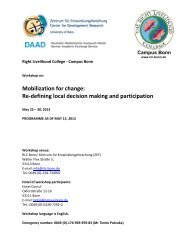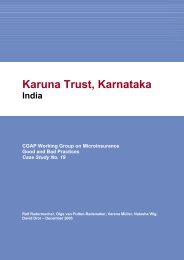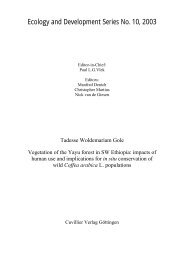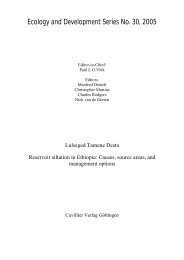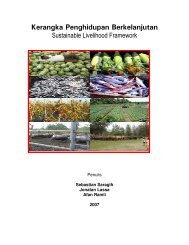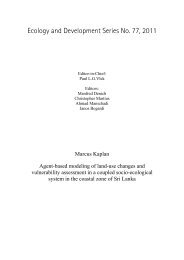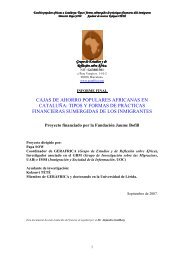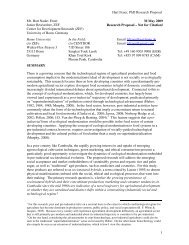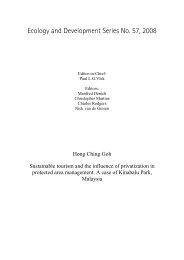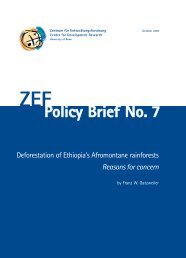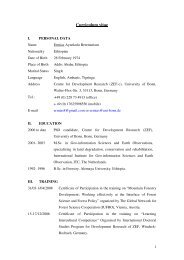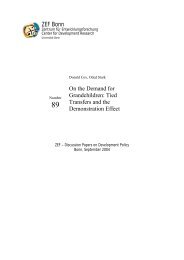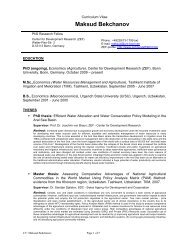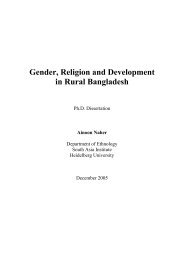ZEF Bonn
ZEF Bonn
ZEF Bonn
You also want an ePaper? Increase the reach of your titles
YUMPU automatically turns print PDFs into web optimized ePapers that Google loves.
tion of landscape elements and their respective carbon pools in vegetation and soils<br />
for extrapolation. Another PhD project will view different development scenarios of<br />
the wetlands in the Mekong River Basin.<br />
The Kyoto Protocol introduced new mechanisms to finance the mitigation of GHG<br />
emissions in developing countries. Production from tropical agricultural systems will<br />
need to increase, to meet the rising demands of an increasing human population<br />
together with changes in consumption patterns over coming decades. Intensification<br />
and/or extensification of agricultural production using conventional technologies<br />
may, in turn, increase GHG production.<br />
To address the issue of mitigating GHG emission, <strong>ZEF</strong> and the Fraunhofer Institute<br />
for Atmospheric Environmental Research jointly organised an international workshop,<br />
which was held in <strong>Bonn</strong> from Nov. 9-11 2001. The workshop, entitled “Tropical<br />
Agriculture in Transition - Opportunities for Mitigating Greenhouse Gas Emissions?",<br />
was attended by 50 scientists from 14 countries.<br />
The participants agreed that the prevention of deforestation - the prime source of<br />
GHG - and the re-forestation of degraded land should have priority in national climate<br />
protection programs of developing countries. Furthermore, it was pointed out<br />
that future research has to include participation of stakeholders from all conceivable<br />
levels, i.e. farmers' co-operatives, non-governmental organisations, national agricultural<br />
research centres and extension services, to devise simple and financially<br />
interesting incentives for reducing emissions. The feasibility of environmentallyfriendly<br />
production techniques has to be disseminated to the public through 'success<br />
stories' documented in public media and on special demonstration farms.<br />
3.1.2 Water scarcity and resource management<br />
<strong>ZEF</strong> tackles the issue of water management at several points. It assesses the functioning<br />
of the water cycle at a watershed level as affected by land cover, analyses<br />
the ecological functions of water vis-à-vis its productive role and monitors the<br />
effect of water utilisation on its quality and potential downstream re-use. <strong>ZEF</strong>'s<br />
interdisciplinary, core program in this regard, the GLOWA-Volta Project on<br />
“Sustainable Water Use under Changing Land Use, Rainfall Reliability, and Water<br />
Demands in the Volta Basin", is already in an advanced stage of development. It is<br />
described in detail in a previous section.<br />
Research<br />
To address the issue of mitigation<br />
of greenhouse gas emission,<br />
<strong>ZEF</strong> and the Fraunhofer<br />
Institute for Atmospheric<br />
Environmental Research jointly<br />
organised an international<br />
workshop in 2001 that was<br />
attended by 50 scientists from<br />
14 countries.<br />
Drought, GLOWA-<br />
Volta project<br />
55



